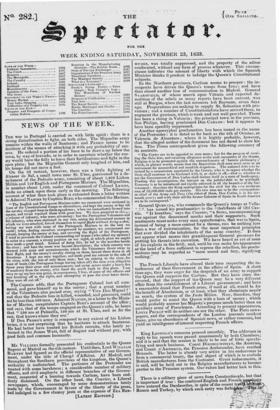NEWS OF THE WEEK.
THE war in Portugal is carried on with little spirit: there is a strong disinclination to fight, on both sides. The Miguelite army remains within the walls of Santarem; and PEDRO seems to be destitute of the means of attacking it with any probability of suc- cess. He ordered a portion of his force to be drawn up below the town, by way of bravado, or in order to ascertain whether the ene- my would have the folly to leave their fortifications and fight in the open plain; but the Miguelite General only laughed at him, and his troops did not move a foot. On the 2d instant, however, there was a little fighting at Alcacer de Sal, a small town near St. Ubes, garrisoned by a de- tachment of the Pedroite army, consisting of about 1,000 Lisbon Militia and 150 English and Portuguese Marines. The Miguelites, in number about 1,500, under the command of Colonel LEMOS, made an attack upon them early in the morning. The following account of what then took place is extracted from a letter written to Admiral NAPIER by Captain BIRT, who commanded the Marines. "The English and Portuguese Marines under my command were stationed in front of the Constitutional troops as skirmishers, and kept the enemy at bay till the cavalry charged them in three sikuadrons; when we immediately formed into square, and twice repulsed them with great loss. We then prepared to cha.g.: a column of infantry, who were advancing ; but the Portuguese Volunteers and 9th infantry, who were stationed in our rear, seeing the determined manner in which we were attacked, betook themselves to rapid flight without firing a shot, leaving my men with some of the Portuguese Marines to do the best we could; when, finding ourselves overpowered by numbers, we commenced our retreat, keeping the enemy at bay, and covering the flight of the Portuguese. I tried to persuade the Colonel commanding our troops (who asked my opinion) to retire to a convect, a strong position on our right, at which place we might have made a good stand. Instead of doing this, he led to the marshes beside the river; and here the scene was beyond description; the whole country was strewed with arms and accoutrements, which the Volunteers threw away in their flight, and the enemy's cavalry closing on them, hewed them down in all directions. I kept my men together, and made good my retreat to the side of the river, with the loss of only three men; but on coming to the river, for want of boats (the Portuguese troops having taken all) the men were obliged to throw away their arms and accoutrements, and swim across under a heavy fire of musketry from the enemy, who lined the north bank in this place. I am sorry to say my loss was great, in consequence, I fear, of some of the officers and men breaking off to the right, and attempting to pass the river lower down. They were all cut off."
The Captain adds, that the Portuguese Colonel lost all com- mand, and gave himself up to the enemy; that a great number of the Volunteers also passed over, crying " Viva Don Miguel !" and that the Pedroite loss in killed, wounded, and prisoners, could not be less than 800 men. Admiral NAPIER, in a letter to the Minis- ter of Marine, recapitulates Captain BIRT'S account of the affair; and says, that of the troops engaged on the Queen's side, he hears that " 200 are at Palmella, 100 are at St. Ubes, and as for the rest, God knows where they are." If Don PEDRO'S army is composed to any extent of his Lisbon levies, it is not surprising that he hesitates to attack Santarem. He had better have treated his British recruits, who lately re- turned in the James Watt, full of disgust and without pay, with good faith and common humanity.


















